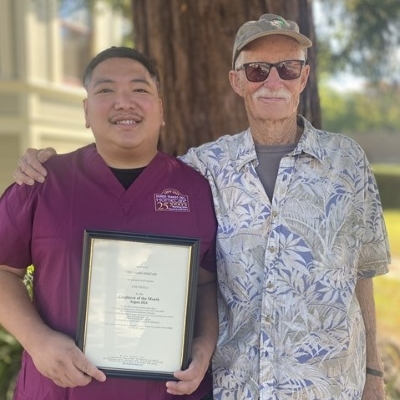Search Results for "senior health"
How to Be the Best Possible Caregiver
Taking steps to learn how to be the best possible caregiver will improve life in a variety of ways for the person in your care – and yourself.
If someone were providing care for you, how would you want that caregiver/care receiver relationship to look? What qualities would shift that level of care from ordinary to extraordinary? Placing yourself in the shoes of the person in your care is the first step to learning how to be the best possible caregiver – something that will have a lasting impact on both your family member and yourself!
What’s the Best Flu Vaccine for Older Adults?
Learn about the best flu vaccine for older adults and make sure the seniors you love are protected.
While COVID-19 continues to dominate our overall health concerns, it’s important to keep in mind that other illnesses can be equally as dangerous, especially for older adults. Flu season is upon us, and it’s time to make sure that the seniors you love are protected. This starts with knowing the best flu vaccine for older adults.
How to Tell the Difference Between Dementia and Medication Side Effects
With so many similarities, can you tell the difference between dementia and medication side effects?
Disorientation. Confusion. Memory loss. While these are certainly hallmark symptoms of Alzheimer’s disease and other types of dementia, they may also come about from taking certain medications. Before automatically assuming an inevitable diagnosis of dementia, review the following list of prescribed medicines that can cause similar adverse effects in order to help tell the difference between dementia and medication side effects.
Caregiver Anger: I Never Expected to Feel So Angry About Caring for Aging Parents!
If you’re feeling angry about dealing with aging parents, know that you’re not alone, and there are steps you can take to help. Contact us for help.
If you were to detail the top 5 emotions you encounter in meeting the caregiving needs of your aging parents, what would they be? Maybe you would first think of emotions like compassion, love, and sometimes, even frustration or stress. Would caregiver anger make the list? In many cases, though family caretakers wouldn’t wish to admit it, it’s quite common to feel angry about caring for aging parents. Read on to learn more about caregiver anger, and reach out to Hired Hands Homecare for the support you need to step away to care for yourself!
The Latest Surprising Facts About Alzheimer’s
The latest surprising facts about Alzheimer’s are changing the way scientists are thinking about what causes the disease.
Surprising facts about Alzheimer’s are surfacing nearly every day, it seems. Take, for instance, amyloid plaques: they’re at the heart of scientists’ hypotheses about what causes Alzheimer’s, and the focus of research is on removing them as an effective treatment option and hopefully, one day, a cure.
Yet a research study led by the University of Cincinnati and in cooperation with the Karolinska Institute in Sweden is turning this thinking upside down. Alberto Espay, the study’s senior author and professor of neurology at UC, shares, “It’s not the plaques that are causing impaired cognition. Amyloid plaques are a consequence, not a cause.”
If Not Amyloid Plaques, Then What?
Espay and the UC team believe the focus should instead shift to … Read More »
Concerned It Might Be Dementia? Here’s How to Bring It Up to the Doctor.
You may be afraid to talk with the doctor if you’re concerned it might be dementia, but these tips can help.
Distress. Embarrassment. Fear. If you’re concerned it might be dementia, the feelings surrounding a potential diagnosis can force you to keep your suspicions to yourself. An AARP survey peeled away some of the layers of emotion to find the reason – namely, worry over losing independence and becoming a burden to others.
While there is some truth to these worries, there are also some misconceptions fueling them. As an example, roughly 1/2 of the participants, who were adults age 40 and over, believe they’re likely to get dementia as they grow older. The truth is that just over 10% of older adults over age 65 are identified as having Alzheimer’s disease.
Because of this, it’s critical for … Read More »
Unique Dementia Signs to Watch For in Latinos
Learn the distinct dementia signs to watch for in Latinos.
A new study sponsored by the Alzheimer’s Association is uncovering some striking results in how dementia may show differently in Hispanic people. While further research is necessary to fully understand whether these differences are the consequence of social/cultural nuances or the dementia itself, it is beneficial information for Latino families to learn the specific dementia signs to watch for in Latinos.
What Are the Unique Dementia Signs for Hispanic Seniors?
Daily Life Activities
One feature of this research was the dramatically faster decline in the capability to do everyday activities, including walking, getting dressed, and taking a shower, when compared with other ethnicities. Andrea Ochoa Lopez, the University of Houston doctoral student who performed the research, explained that the cultural dedication to caring for older relations can be … Read More »
Are the Older Adults You Love Missing Out on These Life-Changing Adaptive Tools?
As many as half of all seniors living at home are not utilizing life-changing adaptive tools.
Consider the many tools you make use of each day – your phone, toothbrush, hairbrush – simple items, but ones you can’t imagine living without. For many seniors, there are basic but life-changing adaptive tools available that could mean the difference between living at home and facing a move to assisted living. Yet almost 50% of seniors living at home are not utilizing these helpful tools – even though costs are minimal.
A recent National Health and Aging Trends Study assessed the ability of older adults to execute tasks such as rising unassisted from a sitting position and walking, and discovered that a large number of the participants could benefit from assistive devices.
Not only that, but the likelihood of older adult … Read More »
What Can I Expect as Dementia Progresses?
If you’re asking yourself, “What can I expect as dementia progresses?” we have the information you need.
One of the first questions in most people’s minds when a loved one is diagnosed with dementia is, “What can I expect as dementia progresses in the weeks, months, and years to come?” We understand that the hallmark of dementia is the increasing decline in cognitive abilities as well as the skills needed to manage daily life. However, each person progresses through these changes at a different pace. There are a variety of factors that will influence the rate of decline, such as:
Prescription drugs the individual is taking
Overall health and physical makeup
The circle of support in place
The individual’s general emotional wellbeing and resilience
There are also other determinants to take into account based on the specific type of dementia diagnosed. As … Read More »
Learn How to Ease Caregiver Stress by Trading Worries for Positive Action
“Worrying is using your imagination to create something you don’t want.” – Abraham Hicks
Discover how to ease caregiver stress in three simple steps.
Worrying can quickly become a way of life for family caregivers. Between age-related concerns, chronic health conditions, and trying to balance a plethora of other commitments, it’s no wonder that anxious thoughts tend to overtake positive, peace-inducing ones, making it difficult to know just how to ease caregiver stress.
How Can You Alleviate Caregiver Worries?
It is possible, however, to take the energy you’re exerting for worry and changing it into productivity. These three simple steps are a great place to start:
To start, write it all down. Worrisome, anxious thoughts have a tendency to swirl haphazardly through our minds. If you write down your thoughts, it corrals them into manageable chunks, while giving … Read More »

















